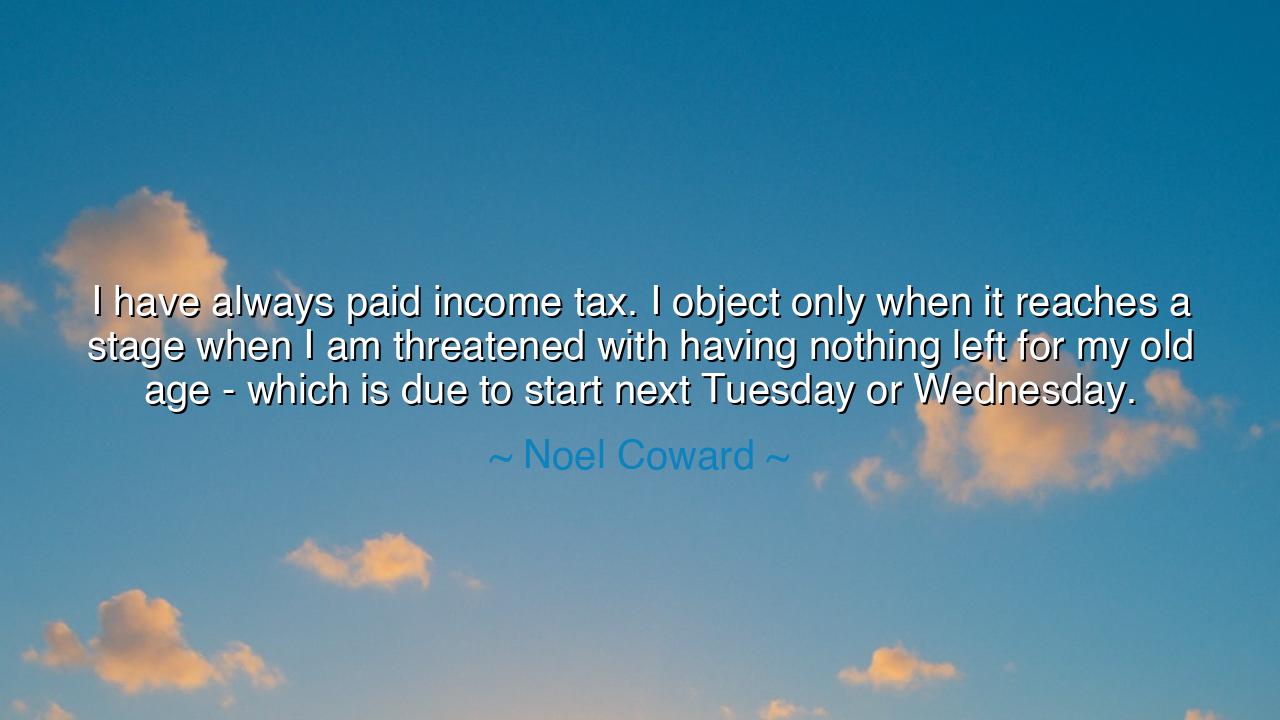
I have always paid income tax. I object only when it reaches a
I have always paid income tax. I object only when it reaches a stage when I am threatened with having nothing left for my old age - which is due to start next Tuesday or Wednesday.






In the age-old struggle between the individual and the state, one truth remains clear: taxation, though necessary for the sustenance of society, can also become a heavy burden. Noel Coward, with his characteristic wit and insight, captures this tension with a striking observation: "I have always paid income tax. I object only when it reaches a stage when I am threatened with having nothing left for my old age - which is due to start next Tuesday or Wednesday." In these words, Coward speaks to the delicate balance between civic responsibility and personal freedom, between the contributions we must make to society and the security we seek for ourselves as we grow older.
The ancients too grappled with the concept of taxation. In the time of Cicero, the Roman statesman and philosopher, taxation was seen as a necessary but often oppressive force. The Roman Empire, in all its grandeur, relied heavily on the labor of its citizens and subjects, imposing taxes that burdened both the rich and the poor. Yet, Cicero and others like him understood that taxes were not merely a financial obligation, but a test of the relationship between the people and their rulers. The fine line between a just system of taxation and one that becomes exploitative is a theme that has echoed through time, from the days of Rome to the modern era. Just as Coward expresses, there comes a point when the balance tips, when the individual is left with nothing, not even the means to care for themselves in their later years.
In Coward’s own time, the rapid social and political changes in Britain led to an increasing burden on the wealthy. His tongue-in-cheek lament about the threat of having nothing left for old age speaks to a deeper truth: when the demands of the state grow too heavy, they can strip away the very security that individuals need to ensure a dignified life in their later years. Old age, a time when one might expect to enjoy the fruits of a lifetime of labor, is suddenly threatened by the very system that should provide for its citizens. This reflection speaks not just to the financial implications of taxation but to the human cost—the feeling that personal autonomy is slipping away as the state takes more than it leaves.
In ancient Greece, there were similar concerns about the balance between the individual's duty to society and the cost of that duty. Socrates, while not opposed to the idea of taxation, famously chose to engage with the state in a manner that challenged its authority and questioned its fairness. In his trial and subsequent execution, Socrates faced the ultimate consequence of a state’s power. His death, while not directly tied to the issue of taxation, illustrates the ancient struggle for autonomy against an overreaching authority. Socrates’ willingness to question the state, to challenge the notion that it had the ultimate claim over the individual, mirrors Coward's own tongue-in-cheek rebellion against the system that would take away his security in old age.
However, while Socrates questioned the state’s role in determining the value of an individual’s life, Coward's words remind us of a different kind of battle—the battle for the right to live without the looming threat of poverty in our later years. Coward’s humor cuts through the absurdity of a system that demands contributions while offering little in return for the individual's long-term well-being. In a way, Coward’s lament is a call for equity and justice in how the fruits of a person’s labor are taxed and redistributed, ensuring that the elderly are not left destitute by a system that once promised them a life of dignity.
The lesson we must take from Coward’s reflection is twofold: First, we must understand that taxation is not an abstract force but a human issue, one that affects our well-being and our security. Fairness in the distribution of wealth and resources is a central theme that has driven societies for millennia, and it is something we must continue to advocate for, not just for our own benefit, but for the benefit of those who will come after us. Second, Coward’s humor calls us to question the system, to recognize that personal autonomy and freedom are not to be sacrificed on the altar of state power. The system must serve us, not the other way around. The wisdom of ages past tells us that a just society is one that allows its citizens to thrive, not just in youth, but in old age, when the individual is most vulnerable.
Practical action, then, calls us to advocate for fairness in how wealth is distributed and how the elderly are cared for. It is not enough to simply pay taxes; we must ensure that these taxes are used wisely, to support the most vulnerable, and to provide security for those who have worked their whole lives. Coward’s words, though delivered with wit, contain a serious reminder that we must remain vigilant against systems that would diminish our future in the name of duty. Let us ensure that, as we grow older, we have more than just the weight of our labor to carry us, but a system that recognizes our worth and provides for our needs.






AAdministratorAdministrator
Welcome, honored guests. Please leave a comment, we will respond soon